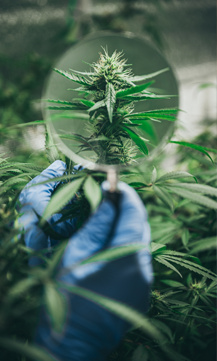 By now, you’ve probably heard the term “GMP,” and know that it refers to “Good Manufacturing Practice,” but what does it really mean, and how does it affect your cannabis manufacturing business? GMP is a widely-accepted system of regulations, designed with consumer safety in mind, to ensure that products are consistently produced in accordance with established quality control and quality assurance standards. The goal of following GMP procedures is to minimize risks, protect the health of consumers and patients, and increase product consistency and quality. Many countries, including the United States, require that food, pharmaceutical, and medical device manufacturers follow GMP procedures and requirements. In the United States, the Food and Drug Administration (FDA), oversees the main regulatory standards for ensuring pharmaceutical quality, known as current Good Manufacturing Practice (cGMPs).
By now, you’ve probably heard the term “GMP,” and know that it refers to “Good Manufacturing Practice,” but what does it really mean, and how does it affect your cannabis manufacturing business? GMP is a widely-accepted system of regulations, designed with consumer safety in mind, to ensure that products are consistently produced in accordance with established quality control and quality assurance standards. The goal of following GMP procedures is to minimize risks, protect the health of consumers and patients, and increase product consistency and quality. Many countries, including the United States, require that food, pharmaceutical, and medical device manufacturers follow GMP procedures and requirements. In the United States, the Food and Drug Administration (FDA), oversees the main regulatory standards for ensuring pharmaceutical quality, known as current Good Manufacturing Practice (cGMPs).
Because cannabis remains illegal at the federal level, the FDA does not regulate cannabis companies and therefore, cannot force cannabis companies to abide by cGMP regulations. However, state and local governments regulating legal (medical or adult-use) cannabis markets are able to mandate that cannabis manufacturers adhere to GMP guidelines. To date, four states; California, Florida, Maryland, and Michigan have already put GMP procedures and regulations in place for their licensed cannabis manufacturers, and we anticipate this number will only grow as legalization continues to expand.
GMP-Compliant SOP Templates
Although it is still fairly rare to see the enforcement of GMP guidelines and certification as it pertains to cannabis production, it is widely predicted that cannabis regulations will evolve to include GMP compliance. In an effort to stay ahead of the curve and serve both the current and future needs of our clients, Simplifya has invested in the GMP certification of several employees in order to grow the in-house expertise necessary to create comprehensive, GMP-compliant SOP (standard operating procedures) templates that our clients can use when implementing GMP procedures and/or certifying that their facilities are GMP compliant.
GMP-compliant SOPs at Simplifya are composed of policies and procedures that are based on the Pharmaceutical Inspection Convention and Pharmaceutical Inspection Co-operation Scheme (PIC/S) and European Union (EU) GMP regulations, and directly reference the FDA’s cGMP regulations. Terms used throughout Simplifya’s GMP-compliant SOPs are consistent with GMP terms, and tasks cite the Code of Federal Regulations Title 21, Parts 110 and 211. GMP-compliant SOPs are drafted by a GMP-certified professional who has undergone training on the following:
 Introduction to Good Manufacturing Practices
Introduction to Good Manufacturing Practices- Good Recordkeeping
- Manufacturing of Herbal Medicinal Products
- Computerised Systems
- Qualification and Validation
- Quality Risk Management
Topics covered in Simplifya’s GMP-compliant SOPs include, but are not limited to:
- Material Management
- Building and Facility Maintenance
- Equipment Cleaning and Maintenance
- Storage of Product Components
- Recordkeeping and Documentation Management
- Staff Training and Hygiene
- Handling Product Complaints
- Controls for Packaging and Labeling
- Validation
- Change Control
- Quality Risk Management
- Salvaging Products
GMP and the Cannabis Industry
As mentioned above, at least a few state and local governments have instituted some degree of GMP requirements, and, in order to proactively forecast the future of GMP in the cannabis industry, analyzing these states’ and localities’ regulatory standards is important.
Michigan

In Michigan, a cultivator who has obtained GMP certification may sell immature plants to a cannabis sales location. Furthermore, licensees must require that employees handle cannabis products in compliance with current GMP procedures in manufacturing, packing, or holding human food, as outlined in Title 21, part 110 of the Code of Federal Regulations.
Maryland
In Maryland, licensed manufacturers are required to develop standard operating procedures, good manufacturing practices, and a training plan before producing medical cannabis concentrates and medical cannabis-infused products.
Florida
Within 12 months of licensure, a medical marijuana treatment center in Florida is required to demonstrate to the Florida Department of Health that all of its processing facilities have passed a Food Safety Good Manufacturing Practices inspection by a nationally accredited certifying body, like the Global Food Safety Initiative (or equivalent). A medical marijuana treatment center must immediately stop processing at any facility which fails to pass this inspection until it demonstrates to the department that such facility has met this requirement.
California
In California, at the state level, a manufacturing licensee is required to develop standard operating procedures, good manufacturing practices, and a training plan prior to producing extracts. Furthermore, Chapter 13: Manufactured Cannabis Safety, Article 3 of the California manufacturing regulations is dedicated to GMP requirements.
In numerous localities in California and in conjunction with state regulations, cannabis manufacturing must develop standard operating procedures, good manufacturing practices, and a training plan prior to producing extracts for the marketplace. Additionally, in the City of Long Beach, a manufacturer is required to employ quality control personnel. In Culver City, cannabis manufacturing facilities creating cannabis extracts are required to submit standard operating procedures, good manufacturing practices, and a training plan to the city as part of the application process.
Why GMP?
Beyond any applicable regulatory requirements, GMP offers numerous benefits to companies employing GMP procedures.
Higher Product Quality
 Because a central component of GMP is quality assurance and control, properly managing product quality through GMP is a sure way to guarantee a consistently high quality product. Aspects of product quality include establishing strong quality management systems, obtaining appropriate quality raw materials, establishing robust operating procedures, detecting and investigating product quality deviations, and maintaining reliable cannabis testing laboratories. Furthermore, as the cannabis industry continues to evolve, retailers and others within the supply chain are predicted to begin demanding that cannabis manufacturers provide evidence of quality and safety in their products.
Because a central component of GMP is quality assurance and control, properly managing product quality through GMP is a sure way to guarantee a consistently high quality product. Aspects of product quality include establishing strong quality management systems, obtaining appropriate quality raw materials, establishing robust operating procedures, detecting and investigating product quality deviations, and maintaining reliable cannabis testing laboratories. Furthermore, as the cannabis industry continues to evolve, retailers and others within the supply chain are predicted to begin demanding that cannabis manufacturers provide evidence of quality and safety in their products.
Competitive Advantage
In terms of obtaining a license from a state or local regulatory agency for cannabis product manufacturing, noting in your application that your facility is GMP-compliant and/or your employees abide by GMP, your application will surely stand out among the other applicants, regardless of if GMP is required or not. As far as post-licensure goes, GMP will allow you the opportunity to streamline processes and produce high-quality products, which will set you apart from competitors.
Mitigation of Potential Future Risk
One major pillar of GMP is risk assessment and management. If a facility properly implements risk assessment and management, the outcome will naturally result in overall risk mitigation. Implementing risk management policies can:
- Facilitate better and more informed decisions.
- Provide regulators with greater assurance of a company’s ability to deal with potential risks.
- Beneficially affect the extent and level of direct regulatory oversight.
Production Stability
Following GMP requirements helps guarantee stability of the production of cannabis products at a facility. Outcomes of production stability through GMP include:
- Increase in volume of production (efficiency increase).
- Decrease in expenses by production.
- Decrease in expenses at storage of inventory items.
- Decrease in costs of “bad” quality of production.
International Opportunities
Because GMP, in some form or another, is consistently required among multiple countries, including Canada, it is advantageous for cannabis companies seeking international business opportunities to implement GMP procedures now. According to Marijuana Business Magazine, “Canadian multinational cannabis firms eager to plant their flags in burgeoning international medical markets are racing to have their facilities GMP certified.” GMP implementation will become of utmost importance in the cannabis industry when it comes to aligning an international cannabis market with a known and accepted standard for medicinal products.
Long Term Financial Savings
 Well-designed GMP operating procedures can also ultimately result in long term financial savings. Although initial implementation can be costly, between the increase in product quality, the competitive advantage, and the decrease in risk and costs associated with non-compliance associated with GMP implementation, long term financial savings is entirely possible so long as GMP operating procedures are properly executed day-to-day by all employees.
Well-designed GMP operating procedures can also ultimately result in long term financial savings. Although initial implementation can be costly, between the increase in product quality, the competitive advantage, and the decrease in risk and costs associated with non-compliance associated with GMP implementation, long term financial savings is entirely possible so long as GMP operating procedures are properly executed day-to-day by all employees.
Preparedness for Potential Legalization at the Federal Level
Although it cannot be said for certain whether cannabis legalization at the federal level will happen anytime soon, experts predict that when/if federal legalization happens, cGMP requirements will follow so as to align and harmonize regulations. According to The National Cannabis Industry Association (NCIA), “while cannabis is not recognized as a legal product at the federal level, federal legalization will inevitably result in the requirement for cannabis producers to conform to cGMPs.”
Simplifya GMP-Compliant SOPs: We’re Here to Help
GMP implementation requires physical changes to facilities, extensive employee training, supply chain and process system changes, a shift in corporate culture, renegotiations with vendors and contractors, and other modifications to business operations. Although it may be daunting, Simplifya’s GMP-Compliant SOPs will offer assistance to complete these tasks. Furthermore, Simplifya GMP-Compliant SOPs will help clients provide both regulators and clients with proof of quality, consistency, and safety to consumers and patients, and give them peace of mind on the path to GMP compliance.
